How to Wash Your Hair: 10 Essential Secrets
Want fabulous hair? It all starts with an epic wash day. Get it right every time with these 10 secrets of how to wash your hair.
When it comes to great hair, few things are more important than making sure it’s clean. Everybody knows that, right? But how much do you really know about what happens when you shampoo and what kinds of products are best for different kinds of hair? No one ever really teaches you how to wash your hair.
All of that changes today. Here are 10 secret strategies for attaining hair-washing nirvana.
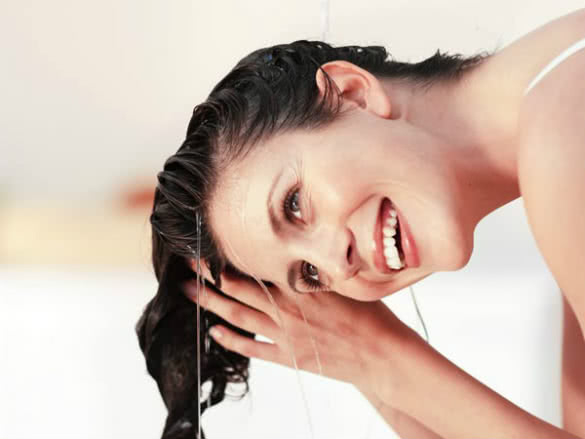
Yes, really. Even before you reach for your favorite bottle of shampoo, you need to prepare your hair.
Some say prepping hair isn’t necessary, but I highly recommend it. Try it once and you’ll see what a huge difference it makes. You won’t wash your hair the old way ever again.
Washing your hair is a stressful experience for your strands. You’ll be doing a lot of manipulation that can damage your ’do. If your hair is relaxed or color-treated it can be even worse. Shampoo itself can be damaging to delicate hair tissue.
A pre-wash treatment can condition follicles and moisturize cuticles before washing.
I’m a natural-haired girl with little patience for beauty routines. For a long time I resisted adding a prep stage to my hair routine. But I’ve learned that a better foundation leads to better results. And that foundation starts with preparation.
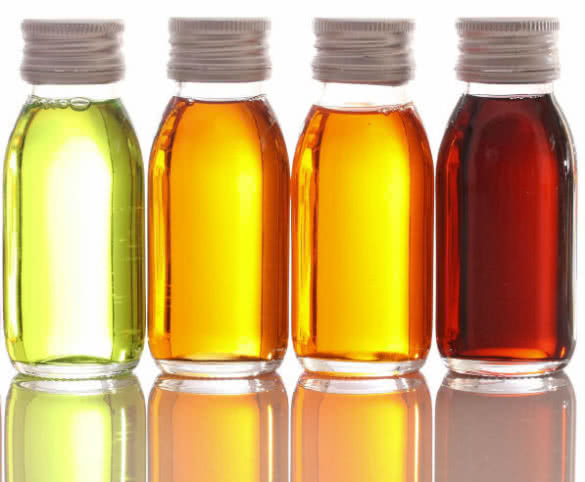
The easiest way to prep your hair is to start with a pre-poo treatment.
A pre-poo is a pre-shampoo treatment, and it turns out it’s easy to do. Simply apply your favorite oil to your hair before shampooing. That’s pretty much all there is to it.
Oil helps moisturize and condition your hair, adding a protective barrier to keep harsh detergents from damaging your strands during washing.
Edible oils are my favorite pre-poo products. You can try anything from coconut oil to extra virgin olive oil to see what works best for you. Coconut oil is my personal fave because it contains tons of vitamins and minerals. It helps my hair retain moisture, too, because of its ability to penetrate the hair. Olive oil is great too. It’s full of vitamin E and antioxidants that promote a healthy scalp.
If you’re feeling adventurous you can pre-poo with honey, Greek yogurt, or avocado.
The best part is you most likely have everything you need for a pre-poo right in your kitchen!
To get the most out of your pre-poo, section and detangle your hair, then coat each section generously with product. Cover your hair with a shower cap and let it rest for an hour. Make sure to rinse the treatment out thoroughly before you apply shampoo.
This may sound crazy, but believe me, your hair will thank you!
It turns out that those different products exist for a reason. Choosing the right shampoo is a key step in making sure you get the best results when you wash your hair.
If you have concerns about moisture, seek out products that boost hydration. If your issues are mainly with frizz, select a shampoo that promotes smooth strands. Picking a shampoo that’s optimized for your hair’s needs will ensure a better outcome.
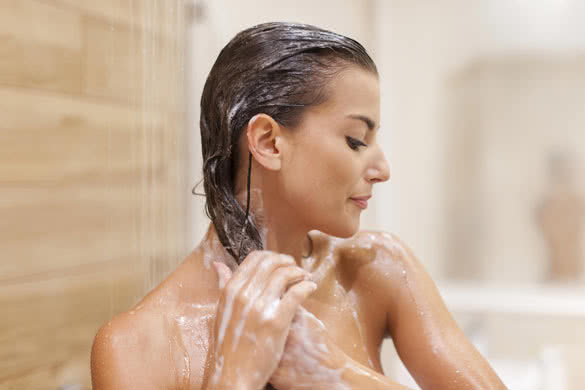
Beauty-industry professionals started the buzz about sulfates, and now it has spread. Fear of sulfates has driven even the most nonchalant beauties to scan the back of shampoo bottles everywhere.
Sulfates are the surfactants the produce lather when using any particular cleansing product. Pretty much all of the shampoos we have used all our lives contain sulfates.
It’s surprising that the substances that make all those suds are actually doing more harm than good, but that’s the truth. Sulfates strip down the hair and remove layers that form a protective barrier against the elements. That “squeaky clean” feeling after a wash is the one that leaves hair looking dull and damaged.
That’s why the beauty industry has created new families of sulfate-free hair products. You should switch right away.
Using a sulfate-free shampoo for the first time can be a bit alarming. With no lather, it’s hard to feel that you’re actually cleaning your hair. This psychological barrier sends many women back to their hair-damaging, sulfate-ridden shampoos. Don’t be one of them!
If you can’t bear to part with your suds, choose a low-sulfate option.
You should also steer clear from shampoos that contain alcohol, which is drying and damaging.
No sulfates, no alcohol. That’s how you pick a shampoo that will clean your hair without harming it.
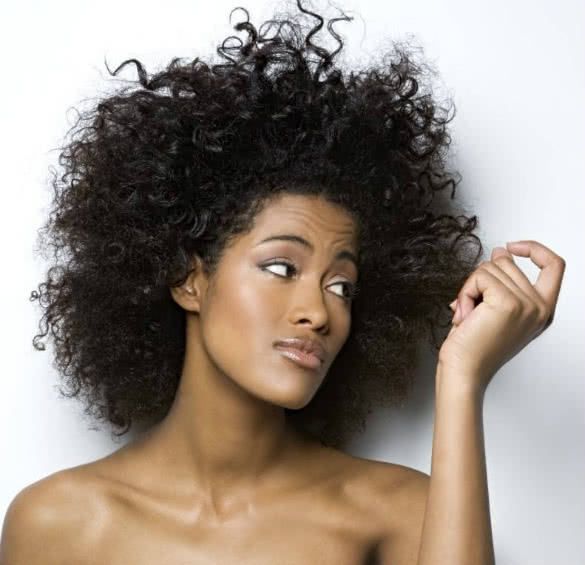
Anyone can write a list of hair-washing tips, and the advice might be pretty good. But every woman’s hair is unique. To get the best results, you must learn more about the distinct peculiarities of your own strands and follicles. That’s true during styling and it’s doubly true when putting together a washing strategy.
A simple strand test can be a good start. Take one strand of hair between your fingers and try to pull the ends apart.
Hair that is very elastic and almost spongelike needs more protein. That fact can guide you as you choose cleansing products and treatments.
If your hair is brittle and snaps, then moisture is your best friend. Focus on optimizing moisture retention during washing.
Once you start paying attention to your hair you can save time and money by focusing on the products and strategies that are right for your hair.
Detangling your hair may be difficult, but it’s important. And you’ve got to do it gently.
The best way to detangle long locks is to approach the task while your hair is still slathered with conditioner. Don’t wait until your hair is dry. That’s just asking for trouble.
You should also consider detangling with your fingers instead of a comb or brush. Tools can cause your hair unnecessary stress.
For best results, take your time. Attack your locks in small sections and work each one thoroughly before moving to the next.
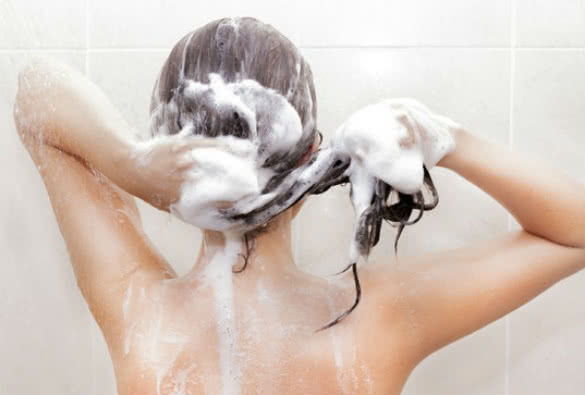
I’ve spent most of my life washing my hair wrong, and you probably have too.
Like most people, my hair-washing routine included application of a generous amount of shampoo all over my head, including my scalp. When I was done with the shampoo, I applied conditioner the same way.
It turns out that’s a very poor way to wash hair.
As a general rule, you should wash your scalp and condition your ends. Most importantly, keep your scalp clean and free of conditioner in order to prevent any gross build-up.
Almost equally as important is your physical approach to working shampoo and conditioner through your hair.
I’ve always tried to emulate the way professional stylists massage my scalp and work the shampoo and conditioner deep into my hair follicles. But it turns out that such manipulation is very rough on hair. It can lead more tangles – and nobody wants more tangles.
For better results, section your hair and wash each section gently with your palms. You’ll have more control over how much product you use and you’ll cut down on the time it takes to untangle your mane.
Finish your routine with a blast of cold water. This seals in moisture, helping to ensure that your strands remain hydrated.
You don’t have to wash your hair daily or even every other day. In fact, overwashing can increase frizziness and leave your hair dull and limp.
For curly and natural-haired girls, a thorough wash every four or five days is all you need to keep your hair in a good state.
If your hair is straight or relaxed, shampoo every three or four days.
Don’t be afraid to spritz with water between washes if you need a hair boost.
You can even condition your hair without washing it if you want to refresh your locks. And thanks to the ever-evolving beauty industry there is now such a thing as dry shampoo. It’s worth a try.
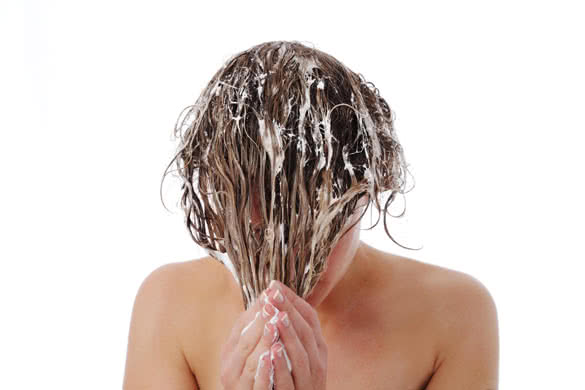
Did I say “condition”?
Conditioning is a must. I would never, ever recommend washing your hair without following up with a good conditioner. The secret of perfect hair is in the conditioner.
It’s important to apply conditioner after every wash. It’s even better if you’re able to do a deep conditioning treatment.
Deep conditioning is much like a pre-poo. You apply the product of your choice, cover your hair, and let it remain for an hour or so. Using heat, whether sitting under a hooded dryer or wrapping a warm towel around your head, maximizes the benefits.
Be sure to rinse your conditioner out thoroughly, as leaving it on your hair can lead to gross buildup. There’s nothing fun about that.
This idea is that you wash your hair as normal, according to your regular schedule, but instead of shampoo you use conditioner only.
You follow all the steps of your usual routine, including the pre-poo. But you use conditioner when you get to the cleansing part of the process.
I co-wash my hair weekly, opting for shampoo only once a month.
There are many benefits to co-washing. Number one is the elimination of the harsh detergents and chemicals that are found in even the gentlest shampoos.
Do you wash your hair daily? Switching to a co-wash every other day lets you maintain your routine without causing your strands undue stress.
You can use the conditioner you have or try out the new cleansing conditioners that are popping up in beauty-supply stores.
That’s it! You’ve made it through the pre-poo, scrutinized labels, researched your hair type, picked your shampoo or cleansing conditioner, and made sure you washed and deep-conditioned your hair carefully. That’s it. That’s how you wash your hair.
When it comes to great hair, few things are more important than making sure it’s clean. Everybody knows that, right? But how much do you really know about what happens when you shampoo and what kinds of products are best for different kinds of hair? No one ever really teaches you how to wash your hair.
All of that changes today. Here are 10 secret strategies for attaining hair-washing nirvana.

Sure she’s smiling…now that she knows how to wash her hair properly. You’ll smile too. via idiva.com
#1 Prep Your Hair
Prep? Really?Yes, really. Even before you reach for your favorite bottle of shampoo, you need to prepare your hair.
Some say prepping hair isn’t necessary, but I highly recommend it. Try it once and you’ll see what a huge difference it makes. You won’t wash your hair the old way ever again.
Washing your hair is a stressful experience for your strands. You’ll be doing a lot of manipulation that can damage your ’do. If your hair is relaxed or color-treated it can be even worse. Shampoo itself can be damaging to delicate hair tissue.
A pre-wash treatment can condition follicles and moisturize cuticles before washing.
I’m a natural-haired girl with little patience for beauty routines. For a long time I resisted adding a prep stage to my hair routine. But I’ve learned that a better foundation leads to better results. And that foundation starts with preparation.
#2 Set the Tone With a Pre-Poo

Open the pantry and help yourself to a tasty bottle of pre-poo. via anacortescenterforhappiness.org
A pre-poo is a pre-shampoo treatment, and it turns out it’s easy to do. Simply apply your favorite oil to your hair before shampooing. That’s pretty much all there is to it.
Oil helps moisturize and condition your hair, adding a protective barrier to keep harsh detergents from damaging your strands during washing.
Edible oils are my favorite pre-poo products. You can try anything from coconut oil to extra virgin olive oil to see what works best for you. Coconut oil is my personal fave because it contains tons of vitamins and minerals. It helps my hair retain moisture, too, because of its ability to penetrate the hair. Olive oil is great too. It’s full of vitamin E and antioxidants that promote a healthy scalp.
If you’re feeling adventurous you can pre-poo with honey, Greek yogurt, or avocado.
The best part is you most likely have everything you need for a pre-poo right in your kitchen!
To get the most out of your pre-poo, section and detangle your hair, then coat each section generously with product. Cover your hair with a shower cap and let it rest for an hour. Make sure to rinse the treatment out thoroughly before you apply shampoo.
This may sound crazy, but believe me, your hair will thank you!
#3 Choose the Right Shampoo
I know I’m not alone when I say I get overwhelmed in the hair aisle. Who knew so many different shampoos existed? There’s shampoo for straight hair, for curly locks, for natural girls, for color-treated divas, for relaxed ladies and the list goes on. It’s a wonder we make it out of the store at all!It turns out that those different products exist for a reason. Choosing the right shampoo is a key step in making sure you get the best results when you wash your hair.
If you have concerns about moisture, seek out products that boost hydration. If your issues are mainly with frizz, select a shampoo that promotes smooth strands. Picking a shampoo that’s optimized for your hair’s needs will ensure a better outcome.
#4 Check the Ingredients

Suds are a sign that you are damaging your hair with sulfates. Switch to a sulfate-free shampoo for best results.
Sulfates are the surfactants the produce lather when using any particular cleansing product. Pretty much all of the shampoos we have used all our lives contain sulfates.
It’s surprising that the substances that make all those suds are actually doing more harm than good, but that’s the truth. Sulfates strip down the hair and remove layers that form a protective barrier against the elements. That “squeaky clean” feeling after a wash is the one that leaves hair looking dull and damaged.
That’s why the beauty industry has created new families of sulfate-free hair products. You should switch right away.
Using a sulfate-free shampoo for the first time can be a bit alarming. With no lather, it’s hard to feel that you’re actually cleaning your hair. This psychological barrier sends many women back to their hair-damaging, sulfate-ridden shampoos. Don’t be one of them!
If you can’t bear to part with your suds, choose a low-sulfate option.
You should also steer clear from shampoos that contain alcohol, which is drying and damaging.
No sulfates, no alcohol. That’s how you pick a shampoo that will clean your hair without harming it.
#5 Know Your Hair

Dry? Curly? Straight? Brittle? Oily? Everyone’s hair is different, so everyone needs a different cleansing regimen. via trusper.com
A simple strand test can be a good start. Take one strand of hair between your fingers and try to pull the ends apart.
Hair that is very elastic and almost spongelike needs more protein. That fact can guide you as you choose cleansing products and treatments.
If your hair is brittle and snaps, then moisture is your best friend. Focus on optimizing moisture retention during washing.
Once you start paying attention to your hair you can save time and money by focusing on the products and strategies that are right for your hair.
#6 Detangle Gently
Untangle your hair – yeah, right. This is easier said than done, especially for a big curly fro-haired gal like me. The longer and curlier your hair, the more time and trouble it takes to untangle it. I’m sure I am not the only curly-haired woman who has contemplated tossing the detangling brush and picking up a razor instead.Detangling your hair may be difficult, but it’s important. And you’ve got to do it gently.
The best way to detangle long locks is to approach the task while your hair is still slathered with conditioner. Don’t wait until your hair is dry. That’s just asking for trouble.
You should also consider detangling with your fingers instead of a comb or brush. Tools can cause your hair unnecessary stress.
For best results, take your time. Attack your locks in small sections and work each one thoroughly before moving to the next.
#7 Wash it Right

Wash the scalp, condition the ends. The part in the middle pretty much takes care of itself. via inhabitat.com
Like most people, my hair-washing routine included application of a generous amount of shampoo all over my head, including my scalp. When I was done with the shampoo, I applied conditioner the same way.
It turns out that’s a very poor way to wash hair.
As a general rule, you should wash your scalp and condition your ends. Most importantly, keep your scalp clean and free of conditioner in order to prevent any gross build-up.
Almost equally as important is your physical approach to working shampoo and conditioner through your hair.
I’ve always tried to emulate the way professional stylists massage my scalp and work the shampoo and conditioner deep into my hair follicles. But it turns out that such manipulation is very rough on hair. It can lead more tangles – and nobody wants more tangles.
For better results, section your hair and wash each section gently with your palms. You’ll have more control over how much product you use and you’ll cut down on the time it takes to untangle your mane.
Finish your routine with a blast of cold water. This seals in moisture, helping to ensure that your strands remain hydrated.
#8 Less is More
When it comes to washing your hair, less really is more.You don’t have to wash your hair daily or even every other day. In fact, overwashing can increase frizziness and leave your hair dull and limp.
For curly and natural-haired girls, a thorough wash every four or five days is all you need to keep your hair in a good state.
If your hair is straight or relaxed, shampoo every three or four days.
Don’t be afraid to spritz with water between washes if you need a hair boost.
You can even condition your hair without washing it if you want to refresh your locks. And thanks to the ever-evolving beauty industry there is now such a thing as dry shampoo. It’s worth a try.
#9 Condition, Condition, Condition

The secret of perfect hair is in the conditioner.
Conditioning is a must. I would never, ever recommend washing your hair without following up with a good conditioner. The secret of perfect hair is in the conditioner.
It’s important to apply conditioner after every wash. It’s even better if you’re able to do a deep conditioning treatment.
Deep conditioning is much like a pre-poo. You apply the product of your choice, cover your hair, and let it remain for an hour or so. Using heat, whether sitting under a hooded dryer or wrapping a warm towel around your head, maximizes the benefits.
Be sure to rinse your conditioner out thoroughly, as leaving it on your hair can lead to gross buildup. There’s nothing fun about that.
#10 Try Co-Washing
Co-washing is an idea whose time has come.This idea is that you wash your hair as normal, according to your regular schedule, but instead of shampoo you use conditioner only.
You follow all the steps of your usual routine, including the pre-poo. But you use conditioner when you get to the cleansing part of the process.
I co-wash my hair weekly, opting for shampoo only once a month.
There are many benefits to co-washing. Number one is the elimination of the harsh detergents and chemicals that are found in even the gentlest shampoos.
Do you wash your hair daily? Switching to a co-wash every other day lets you maintain your routine without causing your strands undue stress.
You can use the conditioner you have or try out the new cleansing conditioners that are popping up in beauty-supply stores.
The Future of Clean Hair
One final tip: Resist the urge to towel-dry your locks. Towels dry your hair, undoing all the good work you have done in keeping your mane moisturized. Get an old t-shirt instead, and rub your hair gently.That’s it! You’ve made it through the pre-poo, scrutinized labels, researched your hair type, picked your shampoo or cleansing conditioner, and made sure you washed and deep-conditioned your hair carefully. That’s it. That’s how you wash your hair.
How to Wash Your Hair: 10 Essential Secrets
![How to Wash Your Hair: 10 Essential Secrets]() Reviewed by Unknown
on
8:13 AM
Rating:
Reviewed by Unknown
on
8:13 AM
Rating:





No comments: